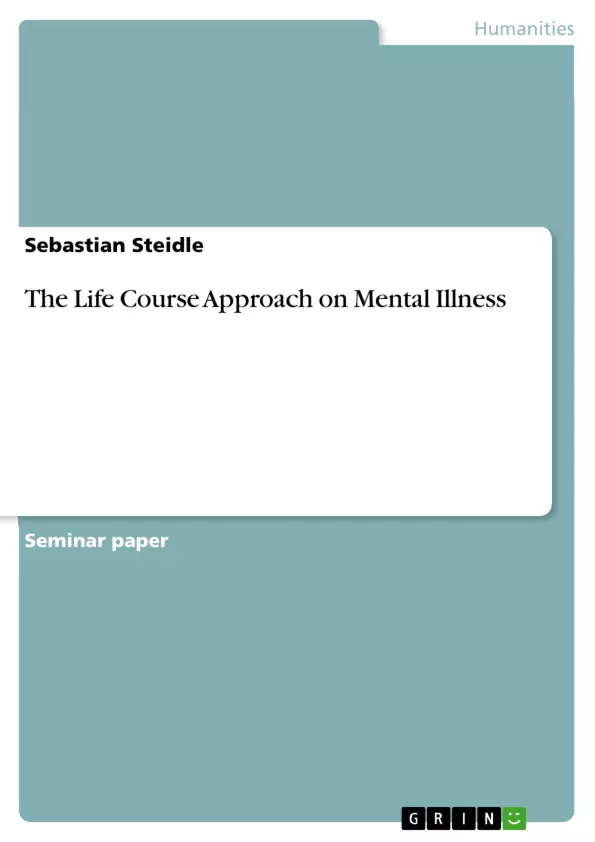Mental Illness has been the subject of several scientific disciplines. Three main approaches on mental illness can be distinguished: The biological approach, which looks for the determinants of mental illness in the physical body, the psychological approach, which looks for the determinants in the (internal) mind and the sociological, who looks for them in the (external) environment or the person's social situation. The sociological investigation of mental illness can be traced back to Durkheim and his study on suicide (originally published in 1897), in which he shows, how suicide rates are shaped by the structural and cultural constitution of a society. Durkheim also advocated the view on mental illness as a special form of breaking the societal norms and values. A perspective which had been picked up in Parsons (1951) analysis of illness as deviance. Most sociologists share the conception of mental illness as the absence of conformity to social norms and values. However, especially until the 1980es, sociology in general and medical sociology in particular, has often been accused of neglecting the field of mental health and illness (Bendelow 2004). Within the current sociological approach on mental illness three dominant theories exist: Stress Theory, Structural Strain Theory and the Social constructivist perspective, in particular labeling theory (e.g. Scheff 1966) and the work of Michelle Foucault (1969).
Inhaltsverzeichnis (Table of Contents)
- Introduction
- Sociological Approaches on Mental Illness
- The Social constructivist Approach
- Structural Strain Theory
- Social Stress Theory
- The life course approach on mental illness
- Empirical Findings
Zielsetzung und Themenschwerpunkte (Objectives and Key Themes)
This paper investigates the relationship between mental illness and the life course, examining how social and environmental factors influence mental health trajectories over time. It utilizes the sociological perspective to understand the complexities of mental illness and its impact on individuals' lives.
- Social construction of mental illness
- The impact of labeling and stigma on mental health
- Social strain and its role in mental health
- Stress theory and the life course
- Medicalization and the changing definitions of mental illness
Zusammenfassung der Kapitel (Chapter Summaries)
- Introduction: This chapter introduces the concept of mental illness and the various approaches to its study, emphasizing the sociological perspective. It traces the history of sociological research on mental illness and highlights key theories like Durkheim's study on suicide and Parsons's analysis of illness as deviance.
- Sociological Approaches on Mental Illness: This chapter delves into three dominant sociological theories explaining mental illness: Social constructivist theory, Structural Strain Theory, and Social Stress Theory. It discusses the labeling theory, the work of Michel Foucault on medicalization, and the role of stigma in shaping mental health.
- The Social constructivist Approach: This chapter focuses on the labeling theory and its application to mental illness. It explores the consequences of labeling individuals as mentally ill, including stigma, social distance, and the potential for self-fulfilling prophecy. It also discusses the evolution of medicalization and the social and political influences on the definition of mental disorders.
- Structural Strain Theory: This chapter presents the Structural Strain Theory, which posits that social strain arising from the mismatch between individual goals and available resources can lead to mental illness. It examines the role of economic disadvantage and social stress in contributing to mental health problems.
- Social Stress Theory: This chapter explores the Stress Theory and its link to the life course approach. It discusses the role of major life events, both positive and negative, in influencing mental health and how these events can lead to stress, coping mechanisms, and potential mental illness.
Schlüsselwörter (Keywords)
The primary focus of this paper lies on the social determinants of mental illness, specifically within the life course framework. Key concepts include labeling theory, stigma, medicalization, social strain, stress theory, and the impact of major life events on mental health trajectories. The examination of the role of social and environmental factors influencing mental health over time is central to this research.
Frequently Asked Questions
What is the life course approach to mental illness?
It examines how social and environmental factors influence mental health trajectories over time, focusing on major life events and social conditions across an individual's life span.
How does labeling theory explain mental illness?
Labeling theory suggests that being identified as "mentally ill" by society can lead to stigma and social distance, which may reinforce the condition through a self-fulfilling prophecy.
What is the Structural Strain Theory regarding mental health?
It posits that mental health problems can arise when there is a mismatch between an individual's goals and the resources or opportunities available to them in society.
What is the difference between biological and sociological views on mental illness?
Biological approaches look for determinants in the physical body, while sociological approaches look for causes in the external environment, social norms, and cultural structures.
What role does stress theory play in the life course perspective?
Stress theory explores how major life events, both positive and negative, create strain and require coping mechanisms that can impact long-term mental health outcomes.
- Quote paper
- Bachelor of Arts Sebastian Steidle (Author), 2016, The Life Course Approach on Mental Illness, Munich, GRIN Verlag, https://www.grin.com/document/372103



